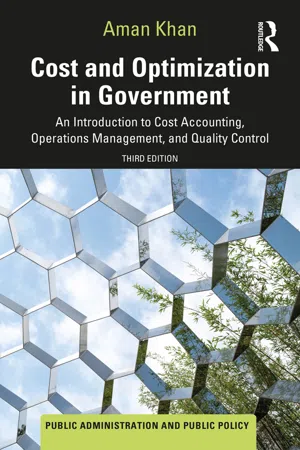
Cost and Optimization in Government
An Introduction to Cost Accounting, Operations Management, and Quality Control
- 448 pages
- English
- ePUB (mobile friendly)
- Available on iOS & Android
Cost and Optimization in Government
An Introduction to Cost Accounting, Operations Management, and Quality Control
About This Book
The careful management of costs and operations are two of the most essential elements for successful operation of any organization – public, private, or nonprofit. This book demonstrates that a good grounding in cost basics, especially those related to cost accounting, operations management, and quality control can help all organizations, in particular government, increase efficiency, improve performance, and, in the end, do a better job of running its everyday operation.
The book is divided into three parts: Part I offers thorough coverage of cost fundamentals, with an emphasis on basic cost concepts, cost behavior, cost analysis, cost assignment, cost allocation, and cost control. Part II deals with optimization in government. Included in this part are traditional or classical optimization with applications in inventory management and queuing, followed by mathematical programming, network analysis, productivity measurement, and games and decisions. Finally, Part III deals with a special case in cost and optimization that has become important in recent years – quality control. Simple, accessible language and explanations are integrated throughout, and examples have been drawn from government so that readers can easily relate to them. Cost and Optimization is required reading for practicing public managers and students of public administration in need of a clear, concise guide to efficient use of public resources.
Frequently asked questions
Information
Part ICost Basics
1Introduction
Background Discussion

A Brief History of Cost Accounting in Government
Table of contents
- Cover
- Half-Title Page
- Series Page
- Title Page
- Copyright Page
- Dedication
- Table of Contents
- Preface
- About the Third Edition
- Acknowledgments
- Part I Cost Basics
- Part II Optimization Basics
- Part III A Special Case in Cost and Optimization
- Review Questions
- Bibliography
- Index